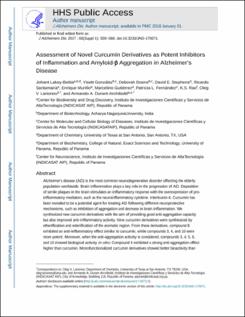Mostrar el registro sencillo del ítem
Assessment of Novel Curcumin Derivatives as Potent Inhibitors of Inflammation and Amyloid-β Aggregation in Alzheimer's Disease
| dc.contributor.author | Lakey-Beitia, Johant | |
| dc.contributor.author | González, Yisett | |
| dc.contributor.author | Doens, Deborah | |
| dc.contributor.author | Stephens, David E | |
| dc.contributor.author | Santamaría, Ricardo | |
| dc.contributor.author | Murillo, Enrique | |
| dc.contributor.author | Gutiérrez, Marcelino | |
| dc.contributor.author | L Fernández, Patricia | |
| dc.contributor.author | Rao, KS Jagannatha | |
| dc.contributor.author | Larionov, Oleg V | |
| dc.contributor.author | Durant-Archibold, Armando A | |
| dc.date.accessioned | 2020-06-25T02:04:46Z | |
| dc.date.available | 2020-06-25T02:04:46Z | |
| dc.date.issued | 2017-01-01 | |
| dc.identifier.other | 10.3233/JAD-170071 | |
| dc.identifier.uri | http://repositorio-indicasat.org.pa/handle/123456789/111 | |
| dc.description | Alzheimer's disease (AD) is the most common neurodegenerative disorder affecting the elderly population worldwide. Brain inflammation plays a key role in the progression of AD. Deposition of senile plaques in the brain stimulates an inflammatory response with the overexpression of pro-inflammatory mediators, such as the neuroinflammatory cytokine. interleukin-6. Curcumin has been revealed to be a potential agent for treating AD following different neuroprotective mechanisms, such as inhibition of aggregation and decrease in brain inflammation. We synthesized new curcumin derivatives with the aim of providing good anti-aggregation capacity but also improved anti-inflammatory activity. Nine curcumin derivatives were synthesized by etherification and esterification of the aromatic region. From these derivatives, compound 8 exhibited an anti-inflammatory effect similar to curcumin, while compounds 3, 4, and 10 were more potent. Moreover, when the anti-aggregation activity is considered, compounds 3, 4, 5, 6, and 10 showed biological activity in vitro. Compound 4 exhibited a strong anti-aggregation effect higher than curcumin. Monofunctionalized curcumin derivatives showed better bioactivity than difunctionalized compounds. Moreover, the presence of bulky groups in the chemical structure of curcumin derivatives decreased bioactivity. | en_US |
| dc.description.abstract | Alzheimer's disease (AD) is the most common neurodegenerative disorder affecting the elderly population worldwide. Brain inflammation plays a key role in the progression of AD. Deposition of senile plaques in the brain stimulates an inflammatory response with the overexpression of pro-inflammatory mediators, such as the neuroinflammatory cytokine. interleukin-6. Curcumin has been revealed to be a potential agent for treating AD following different neuroprotective mechanisms, such as inhibition of aggregation and decrease in brain inflammation. We synthesized new curcumin derivatives with the aim of providing good anti-aggregation capacity but also improved anti-inflammatory activity. Nine curcumin derivatives were synthesized by etherification and esterification of the aromatic region. From these derivatives, compound 8 exhibited an anti-inflammatory effect similar to curcumin, while compounds 3, 4, and 10 were more potent. Moreover, when the anti-aggregation activity is considered, compounds 3, 4, 5, 6, and 10 showed biological activity in vitro. Compound 4 exhibited a strong anti-aggregation effect higher than curcumin. Monofunctionalized curcumin derivatives showed better bioactivity than difunctionalized compounds. Moreover, the presence of bulky groups in the chemical structure of curcumin derivatives decreased bioactivity. | en_US |
| dc.language.iso | en | en_US |
| dc.subject | Aβ aggregation | en_US |
| dc.subject | anti-inflammatory activity | en_US |
| dc.subject | Alzheimer's disease | en_US |
| dc.subject | brain inflammation | en_US |
| dc.subject | curcumin | en_US |
| dc.subject | curcumin derivatives | en_US |
| dc.subject | IL-6 | en_US |
| dc.subject | synthesis | en_US |
| dc.title | Assessment of Novel Curcumin Derivatives as Potent Inhibitors of Inflammation and Amyloid-β Aggregation in Alzheimer's Disease | en_US |
| dc.type | Article | en_US |

